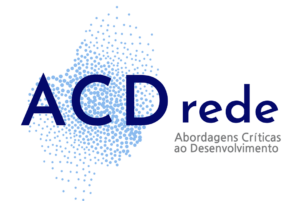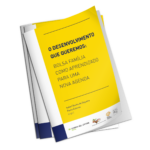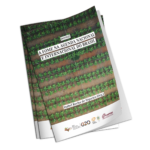(ACD-Rede) Critical Approaches to Development
(ACD-Rede) Critical Approaches to Development
The network of Critical Approaches to Development (ACD-Rede) began as a spontaneous organization among academics, activists, and professionals from the Global South who critically engage with development.
The initial event of this network was the workshop held in November 2018, in Rio de Janeiro, Brazil. This first workshop was organized by Professor Isabel Rocha de Siqueira, with support from then-postdoctoral researcher Paulo Chamon and graduate students Ana Carolina Cardoso and Tatiana Castelo Branco from the Institute of International Relations at PUC-Rio (IRI/PUC-Rio). During the workshop, a secretariat for the network was established, composed of the then-students Ana Carolina Cardoso, Beatriz Teixeira, and Mariana Gamarra.
In 2019, a second international workshop was held at the BRICS Policy Center (BPC), upholding the same plural engagement and broad support from students of IRI/PUC-Rio and other members of the ACD-Rede. Both workshops included calls for papers, mentoring sessions, and experience sharing.
Despite the suspension of in-person meetings during the pandemic, the network remained active, organizing panels and discussions at national and international conferences, inspiring scientific initiation projects, dissertations, and theses, as well as producing course programs for both academic and professional graduate studies at IRI.
In 2024, the ACD-Rede established a partnership with the Socioenvironmental Platform of the BPC in a project funded by the Ford Foundation. This important collaboration made possible both the restart of workshops in 2025 and the creation of a support program for students in their studies.
Critical Approaches to Development
Our conversations started with a common reflection: the mainstream discourse on development shows numerous signs of failure. The limitations of focusing on projects based on linear, causal, and scientistic formulations, top-down instruments, and objectives driven almost exclusively by the fulfilment of goals concerning what is understood as “outcome,” “evidence,” and “efficiency” have long been pointed out.
From the perspective of effects, decades of mainstream development projects have not prevented—and in many cases seem to have contributed to—the exacerbation of inequalities, violations of rights, withdrawal of social protections, and environmental destruction. Furthermore, these projects often remain unable to recognize subjects and ways of life different from modern Western standards, except through the logic of lack or scarcity—of resources, goods, resilience, etc.
In this context, what can we expect from alternative approaches to development and alternatives to development (alternative developments / alternatives to development)? What types of theoretical and practical resources can provide not only the necessary critique but also its transformative impulse? What counter-narratives, counter-archives, and different starting points (and arrival points) have marginalized experiences offered? How can we make these experiences resonate and place them at the center of crucial discussions about structural power relations in the field?
The main objectives of the ACD-Rede are:
a) to facilitate the formation of a shared body of knowledge based on experiences and perspectives from the Global South, in order to reorient the debate on development from the margins;
b) to provide and create networks through plural dialogue among the academic, activist, and professional development sectors; and
c) in the long term, to rethink the role of knowledge production regarding alternatives to development and alternative developments.
Publications
The Development We Want: Bolsa Família as a Learning Experience...
The various models of a country's development are at the heart of the interdisciplinary debate shaping Brazil’s current reality. However, much is lost due to opinions driven by love or...
Dossier: Hunger on Brazil’s National and International Agenda
Upon assuming the presidency of the G20, the Brazilian government established the priorities of its leadership in the group as advancing three agendas: reducing hunger, inequality and poverty; combating climate...









